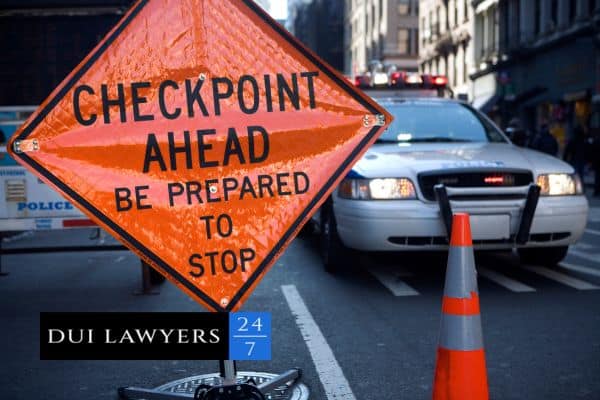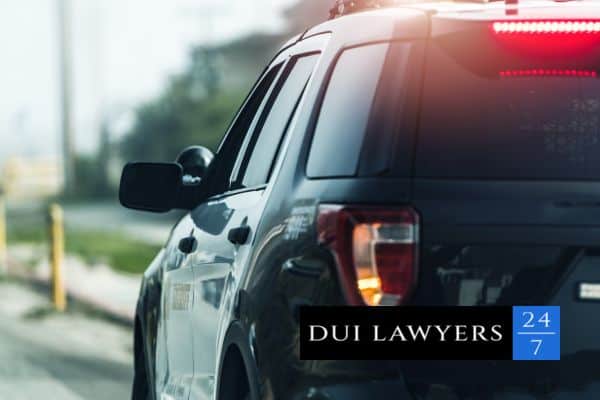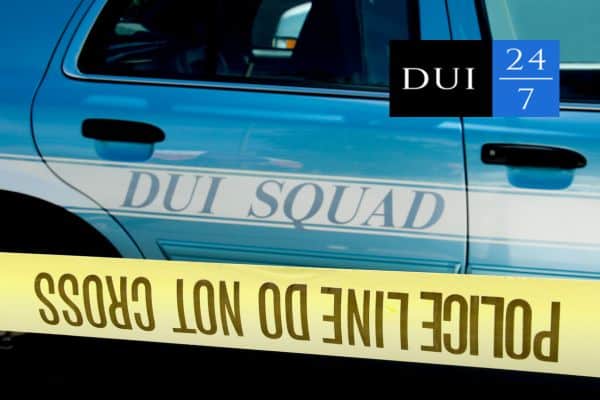DUI checkpoints in Illinois are put into place to reduce drunk driving. These checkpoints allow law enforcement to randomly stop drivers for signs of intoxication or driving under the influence of drugs. However, drivers stopped at a checkpoint are not required to answer questions or provide information about their drinking habits.
The state police agency sets a procedure for DUI checkpoints, including publishing the location and times ahead of time, specifying the type of vehicles that will be stopped, the number of officers present, and the type of tests that may be given.
For more information about checkpoints and your DUI case, call an experienced Illinois DUI attorney today at 847-999-7616 for a free consultation!
What is a DUI Checkpoint?
DUI checkpoints, or sobriety checkpoints, aim to increase road safety in Illinois by catching intoxicated drivers who are operating under the influence of alcohol. The police set up these checkpoints at intervals along a road or intersection using traffic cones and randomly flag drivers down to check for signs of intoxication and ask the driver questions. Officers may request drivers to take a field sobriety test or breathalyzer test to determine if they have been drinking.

The purpose of sobriety checkpoints is not only to catch drunk drivers, it also serves as a deterrent by making more people aware of the consequences of their actions. DUI checkpoints send a strong message that drunk driving is a felony punishable by the law.
What are the Legal Regulations for Setting Up and Running DUI Checkpoints in Illinois?
The constitutionality of DUI checkpoints in Illinois has been debated for years. Michigan had a sobriety checkpoint program in the 80s that was challenged as being unconstitutional for violating the Fourth Amendment. Michigan courts agreed and it appeared that similar programs would be ruled unconstitutional nationwide. However, the Supreme Court ruled in favor of Michigan Dept. of State Police v Sitz, deeming these stops constitutional under Fourth Amendment law.
The court's ruling established a traffic laws precedent allowing any state to conduct DUI checkpoints based on reasonable suspicion such as the smell of alcohol, provided they adhere to certain restrictions such as public notice and safety measures. Following this decision, states implemented DUI checkpoints in different forms and jurisdictions, often including additional citations for various violations.
Field Sobriety Tests and Reasonable Suspicion
Law enforcement uses Field Sobriety Tests (FSTs) to determine if someone is impaired by alcohol or other substances. These tests can help decide whether or not to arrest someone for a DUI criminal conviction or official misconduct. During FSTs, officers ask individuals to perform physical tasks, like counting backward or walking in a straight line. While it may feel mandatory, individuals are not required to comply with FST requests. Officers may forget to tell individuals their right to refuse FSTs.
Refusing tests may make it harder for police to prove a case, but it does not guarantee the dismissal of criminal charges. Some sober motorists choose to undergo FSTs to demonstrate sobriety for release later on. It is crucial for those stopped for suspicion of DUI to understand their rights during FSTs.
What Does Reasonable Suspicion Mean?
Reasonable suspicion is a legal term used for investigative stops or detentions. It applies to persons, vehicles, or premises, like DUI checkpoints in Illinois. To prevent unreasonable searches, officers must have more than a reasonable suspicion that a crime is happening. There must be facts or evidence that lead the officer to believe that a crime is occurring. Officer reasonable suspicion is a lower standard of proof than probable cause, which requires more substantial evidence.
DUI checkpoints are essential to curb impaired persons' drunk driving, but they must follow Fourth Amendment guidelines. It is crucial for individuals stopped at DUI checkpoints to know their rights.
What are the Field Sobriety Tests Commonly Used in DUI Checkpoints?
Police officers use sobriety testing on suspected drunk drivers who may have been demonstrating improper lane usage. Drivers at sobriety checkpoints will undergo tests such as standing on one leg, nystagmus, and walking and turning. Field sobriety tests assess balance, coordination, motor skills, and eye movement, all of which can be affected by drugs and alcohol.
The Standing on One Leg test checks balance and coordination, while the Nystagmus test detects signs of intoxication. The Walk and Turn test requires walking in a straight line for nine steps without losing balance. These tests along with conversations with police officers determine complete sobriety or whether a driver is fit for driving after consuming alcohol or drugs.
Law Enforcement Officers and Procedures Relating to DUI Checkpoints
Illinois law dictates the legality of sobriety checkpoints. Law enforcement officers can conduct DUI checkpoints at any time of day or night. These checkpoints aim to catch drivers who are drunk driving under the influence of alcohol or drugs.
During a checkpoint, officers ask for the driver's license, registration, and proof of insurance, while also observing their physical condition such as an odor of alcohol and behaviors for signs of intoxication. If the officer has reasonable suspicion of impairment, field sobriety testing may be administered. Drivers can refuse any search or seizure at the checkpoint. If the tests indicate impairment, the driver may face a DUI felony conviction.
In Illinois, What is the Process for Stopping a Vehicle at a DUI Checkpoint?
Police often set up DUI checkpoints in cities near gas stations on holiday weekends. Randomized drivers passing through must stop and provide their license and registration. The officer may ask questions but you can decline to answer.

If the officer thinks you're sober, you can continue driving. If they think you were reckless driving or drunk driving they may perform a field sobriety test. Depending on the results, you may be arrested and face drunk driving charges or drug-related offenses while driving.
How Long Can Police Detain Me at a DUI Checkpoint in Illinois?
If you're arrested at a DUI checkpoint, protect your rights. Contact an experienced criminal defense attorney immediately. Don't answer questions without an experienced attorney present. Your criminal defense lawyer will investigate the checkpoint and obtain the necessary records for a strong DUI defense.
Remember the details of the checkpoint, such as location and specific instructions. Provide accurate information to your attorney, including any video recordings or photos taken during the stop. Meticulous preparation can help support your case in court.
Penalties for Drunk Driving in Illinois
In Illinois, it is illegal to operate a motor vehicle with a blood alcohol content (BAC) of .08 or higher. If you are pulled over in Illinois and your BAC is above the legal limit, you face both criminal and administrative penalties.
Criminal Penalties: DUI convictions can result in serious fines, jail time, and license revocation. The severity of the penalty depends on the number of prior DUI felony counts the driver has and whether any aggravating circumstances are present.
Administrative Penalties: A driver who is convicted of DUI will face license suspension, fees, and possible revocation depending on their age and the severity of the offense. Drivers may also be required to attend an Alcohol Evaluation Program, install an Ignition Interlock Device, or complete a drug/alcohol program.
What are the Potential Consequences of Refusing to Take Chemical Tests After Being Stopped at a DUI Checkpoint in Illinois?
Drivers are not obligated to take field sobriety tests (FSTs) if they have been pulled over on suspicion of driving under the influence. Although FSTs provide evidence for the police to arrest the driver, refusing to take them will not always prevent an arrest. All states also have “implied consent” laws that require drivers arrested for DUI to submit to blood alcohol content testing for their DUI charge to be prosecuted. Therefore, even if a driver refuses the FSTs test, it is important that they still comply with any request from the police officers regarding blood alcohol concentration (BAC) testing.
Related Content: How to Beat a DUI in Illinois
Sobriety and DUI checkpoints must be valid according to laws for their evidence to be admissible in court. The checkpoint must meet the standards imposed by federal and state laws about location, duration, and purpose among other criteria. Any relevant evidence gathered from a sobriety checkpoint may be challenged in court if it is found that such checkpoint fails any of these criteria. Therefore, knowing your rights at sobriety checkpoints is essential when facing a DUI, even if you decide against taking the field sobriety tests requested by law enforcement officials.
What are the Penalties for DUI Convictions in Illinois?
The penalties for a DUI conviction in Illinois depend on the severity of the offense, as well as the offender's prior criminal history. For a first-time conviction, an offender may face up to one year in jail and fines of up to $2,500. They may also be required to complete community service or an alcohol education program. Additionally, their driver’s license may be suspended for up to one year.
For subsequent convictions within 20 years of the first, the penalties can increase significantly. A second-time offender could face up to three years in prison and fines of up to $25,000. The suspension period may be extended to five years, and the offender may also be required to install an ignition interlock device in their vehicle.

In addition to criminal penalties and administrative consequences, there are other potential implications of a DUI conviction. For instance, the driver may experience difficulty getting car insurance or securing future employment in certain fields. In some cases, the offender will also have their vehicle impounded for up to six months. Furthermore, if the DUI conviction is within five years of another, the offender may face additional penalties such as mandatory jail time.
Contact an Experienced DUI Attorney at DUI 24/7 Today
If you have been charged by police officers with a DUI criminal conviction in Illinois, you must contact an experienced DUI attorney at DUI 24/7 as soon as possible. Driving under the influence (DUI) of alcohol and drugs is a serious offense in Illinois and can result in loss of driving privileges, heavy fines, jail time, and other penalties including license suspension or revocation.
At DUI 24/7, our experienced and caring attorneys are dedicated to helping you build a strong defense to fight your drunken driving charges and protect your rights. Contact us today for a free initial consultation.


